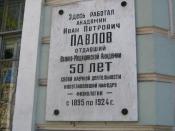Ivan Pavlov is best known for his experiments and theories regarding classical conditioning and is often referred to as the Father of Classical Conditioning. (Lawry, 1981). Few know, however, that Pavlov initially planned on becoming a priest, like his father. He was born in 1849 in the small Russian town of Ryazan, the eldest son in a poor family. In 1860, at the age of 11, Pavlov finally began his formal education at Ryazan Ecclesiastical High School and, afterwards, entered into the local seminary. Eventually though, in 1870, Pavlov left the seminary to attend St. Petersburg University to study science. By his third year at St. Petersburg, he decided to focus specifically on physiology. By 1875, Pavlov finished his education at St. Petersburg and went on to study medicine at the Medico-Surgical Academy, where he graduated in 1879 (Gray, 1979).This unique educational path set the stage for Pavlov to become one of the most renowned and influential psychologists of his time.
Before he began his career in psychology, however, he was known as a physiologist. After graduation, Pavlov began working for the Medico-Surgical Academy, where the director of the medical clinic, Professor Botkin, had put him in charge of the new laboratory for animal testing. Pavlov first began researching blood pressure and the innervations of the heart in 1876. He discovered that blood pressure remained constant in spite of significant changes in blood volume stimulated by fasting, feeding, or watering the organism (Gray, 1979). Although these findings left no long-term impression on the field of physiology, the experiments did allow Pavlov to perfect his research methods.
Pavlov did not approve of the then-popular acute experiments, in which the animal was anesthetized, the organ of interest separated and examined as quickly as possible, and the animal killed. Pavlov was a...



Nice job.
You did a nice job at sumerizing Pavlov's accomplishments. Nicely cited as well.
4 out of 4 people found this comment useful.